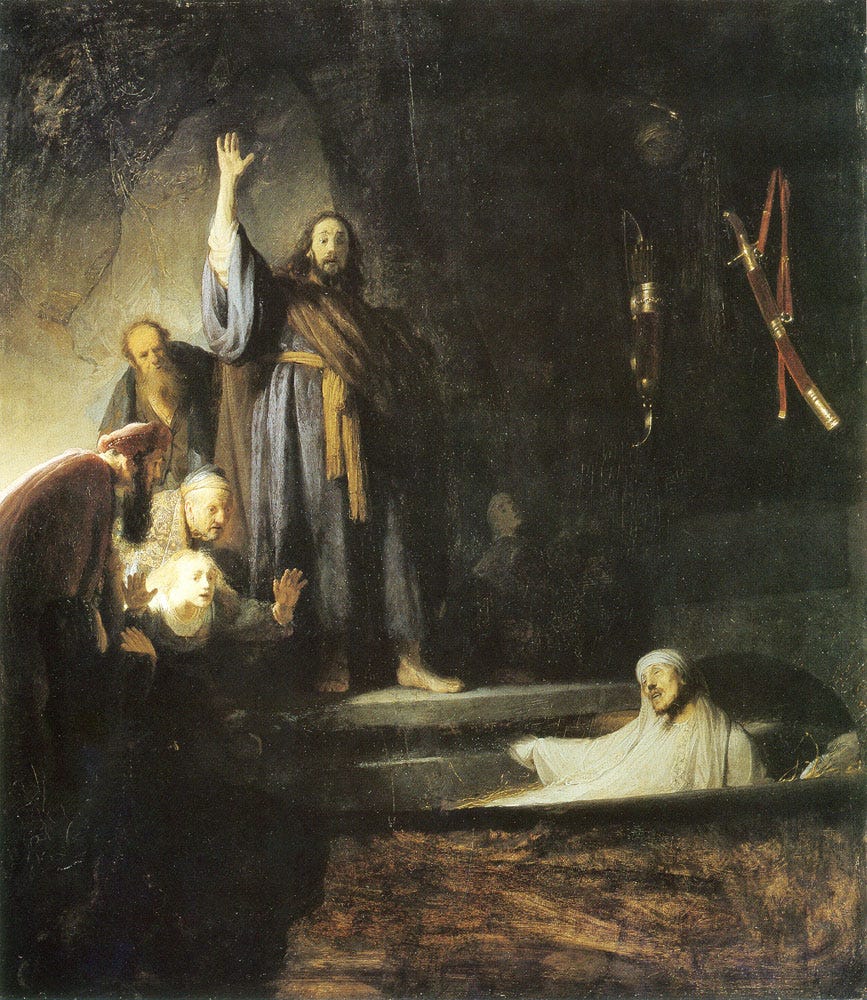Only Death Makes Possible an Economy of Scarcity
A future no longer bounded by Death frightens those with a stake in the status quo
John 11
The Gospels writers did not expect you to receive their testimony as discrete pericopes. Much like the apostle’s epistles, the evangelists intended you receive the gospel narrative as a narrative, beginning, middle, and end. The surrounding context around any passage is necessary for its intelligibility.
Take the upcoming Gospel text assigned by the lectionary, Christ calling Lazarus from the tomb in John 11.
Jesus raising of Lazarus from the dead seals Jesus’s own death as sure and certain.
In the following chapter, Judas is at the supper table with the formerly four days dead guy when he grumbles about the recently deceased’s sister lavishing a Tesla’s worth of Chanel No. 5 on Jesus. Truly, 300 denarii was the rough equivalent to $45,000.00. “Why was this perfume not sold and the money donated to Make Israel Great Again?” Judas objects.
Make no mistake.
Judas’s protest is a political position.
In first century Israel, “poor” was a political category. The poor weren’t lazy or left behind. The poor were the oppressed. Money’s tight when you’ve got to foot the bill for your own military occupation— that’s why the Christmas story kicks off with a census. Just read your Old Testament— it’s not a minor theme in scripture— the poor were poor because they were oppressed. If you don’t understand the relationship between poverty and oppression you won’t understand Palm Sunday. You won’t understand how the Messiah they anticipate with shouts of hosanna produces first their disappointment and then their betrayal when the “Messiah” they get turns out to be the Messiah named Jesus.
Judas isn’t simply suggesting that this down payment’s worth of perfume should’ve been shared with the poor; he’s arguing that it’d be better spent on the cause. Judas isn’t griping that they should’ve given the money to feed the poor. He’s saying they should’ve used the money to free them. To free the poor. To liberate the oppressed.
Judas’s point is not just about charity. Judas’ point is about justice. After all, Judas is named for Israel’s most famous armed revolutionary. It’s a campaign contribution’s worth of cash Judas watches Mary rub into Jesus’ calloused feet.
Yet—
Even as Judas stews over the cost benefit analysis and political possibilities such a sum might realize, he’s sitting at the supper table across from a guy who just recently had been wormwood for over half a week. Judas had watched graveside as Jesus called Lazarus out of the tomb, stinking with death and tripping over his burial clothes he was so surprised. In fact, Jesus had commanded him to be dead no longer, “Lazarus, come out!” From dust he came and to dust he returned and then, by the Word who works what he says, he returned again.
Judas has just passed the mashed potatoes to the once dearly departed Lazarus, but as soon as Judas sees Mary pull out some some five figure Himalayan Obsession he’s back to thinking in terms of scarcity.
This puts Judas in the same camp as Caiphas.
At the end of John 11— the verses the lectionary conspicuously and suspiciously omits— John tells us that a crowd of Jews, having witnessed Jesus speak Lazarus forth from the dead, began “believing into Jesus.”
Some of these bystanders, John says, went and tattled on Jesus to the Pharisees and the Pharisees went and tattled to the chief priests and the chief priests went and tattled to the Chief Priest, Caiphas.
And how does Caiphas respond to news of Jesus’s power over Death?
“If we let him go on like this,” Caiphas worries, “everyone will believe into him, and the Romans will come and destroy our nation.”
Sit with this for a moment—
Keep reading with a 7-day free trial
Subscribe to Tamed Cynic to keep reading this post and get 7 days of free access to the full post archives.




